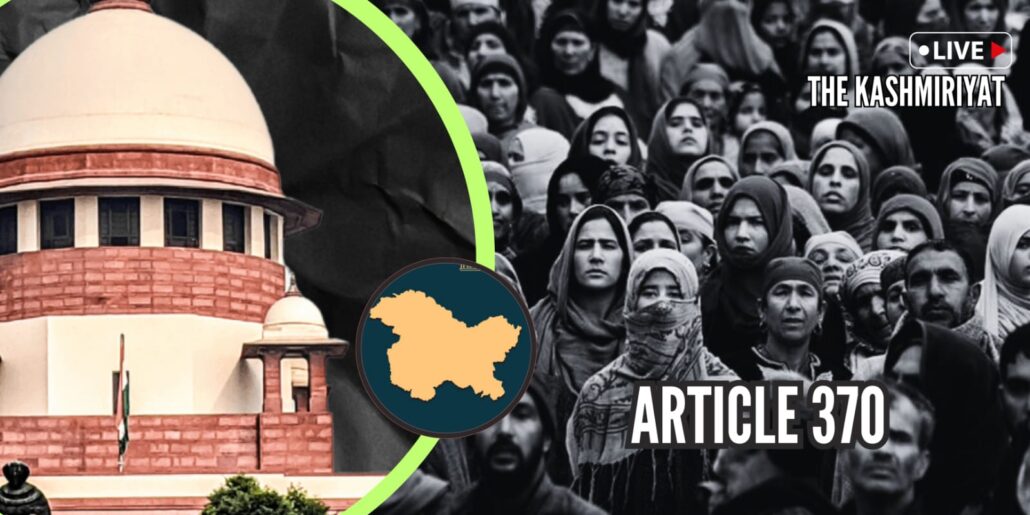
Four years following the revocation of Article 370 in Jammu Kashmir, the Supreme Court is gearing up to review challenges to this decision on Monday, December 11.
Leading this review is a five-judge Constitution bench headed by Chief Justice of India DY Chandrachud and the proceedings will begin at 1030 A.M.
In Jammu Kashmir, extensive preparations are underway to handle potential escalations in tensions during the Supreme Court hearing.
Simultaneously, political leaders in Kashmir have stated that they would continue their fight for the restoration of Article 370, if the court rules against the petitioning party.
They remain staunch in their push for the reinstatement of Article 370, which granted special status to Jammu and Kashmir.
Former chief Minister of Jammu Kashmir, Mehbooba Mufti has been put under house arrest، People’s Democratic Party said۔
Even before Supreme Court judgement is pronounced, Police has sealed the doors of the residence of PDP President @MehboobaMufti and put her under illegal house arrest. pic.twitter.com/Ts2T7yFMrE
— J&K PDP (@jkpdp) December 11, 2023
In a post on X, formerly Twitter, PDP said, “Even before Supreme Court judgement is pronounced, Police has sealed the doors of the residence of PDP President @MehboobaMufti and put her under illegal house arrest.”
Meanwhile, the spokesperson of Jammu Kashmir National Conference also said that the former CM Omar Abdullah has been put under house arrest.
The claims, however, have been rejected the Police and LG Manoj Sinha.
Back in 2019, several petitions contesting the abrogation of Article 370 and the enactment of the Jammu and Kashmir Reorganisation Act, 2019—resulting in the division of the erstwhile state into two union territories: Jammu Kashmir, and Ladakh—were referred to a Constitution bench.
This five-judge bench, comprising CJI Chandrachud, justices S K Kaul, Sanjeev Khanna, BR Gavai, and Surya Kant, presided over 16 days of arguments presented by petitioners and the Center.
After the hearings, the apex court reserved its verdict on September 5, scheduled for announcement on December 11.
Live updates
11:00 A.M: Bench assembles.
CJI : I will read out the essence. There are three judgments. One by CJI for himself for J Gavai and Surya Kant. There is a concurring opinion by Justice Kaul. Justice Sanjiv Khanna has concurred with both.
CJI : Issue. Whether Article 370 temporary. b) Whether substitution of ‘constituent assembly’ by legislative assembly by using 370(1)(d) valid
CJI : Whether Presidential order invalid for lack of recommendation of J&K Constituent Assembly.C
CJI : Whether the J&K Reorganisation Act bifurcating the State into two UTs constitutionally valid.
CJI : Whether the Presidential rule imposed in December 2018 and subsequent extensions valid.
CJI : Whether the Presidential proclamation valid. Court need not adjudicate on this since petitioners did not challenge it. And in any case it was withdrawn in Oct 2019.
CJI : Whether the Presidential proclamation valid.
Court need not adjudicate on this since petitioners did not challenge it. And in any case it was withdrawn in Oct 2019.
CJI : There are limitations on power of the Union in states when proclamation of presidential rule is in force.
[12/11, 11:05 AM] Mehran TK: CJI : Exercise of power under Article 356 must have a reasonable nexus with the objective of the proclamation.
CJI : Every decision taken by Union on behalf of State during Presidential rule not open to challenge…this will lead to the administration of state to a standstill…
CJI : Argument of petitioners that Union cannot take actions of irreversible consequences in the State during Presidential rule is NOT ACCEPTED.
CJI : Argument of the petitioners can the Parliament can only make the law-making powers of the State when the Presidential rule is in force is NOT ACCEPTED.
CJI : Whether Jammu and Kashmir retained an element of sovereignty or internal sovereignty when it joined the Union of India.
We have held NO.
